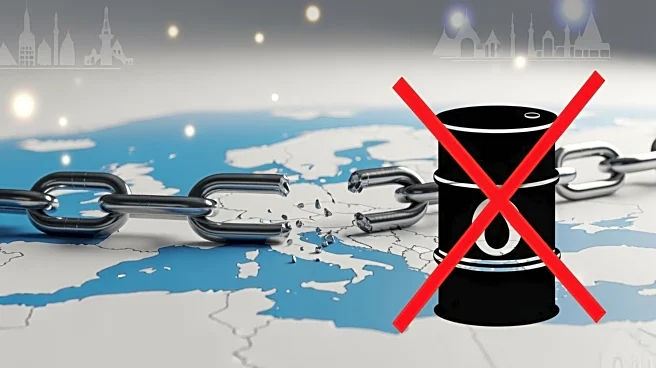What's Happening?
The United States is intensifying its diplomatic efforts to persuade Hungary to cease its reliance on Russian oil imports. Matthew Whitaker, the U.S. Ambassador to NATO, emphasized the need for Hungary to develop
a plan to transition away from Russian energy sources. This comes as Hungary has faced criticism from fellow European Union member states for its continued engagement with Russia, including maintaining contact with Russian leadership. The U.S. has recently imposed sanctions on major Russian oil companies, Rosneft and Lukoil, further pressuring Hungary to reconsider its energy strategy. Despite these diplomatic challenges, Hungarian Prime Minister Viktor Orban has indicated that the country is not yet ready to abandon Russian oil, suggesting ongoing resistance to U.S. and EU pressure.
Why It's Important?
The U.S. push for Hungary to cut off Russian oil imports is significant in the broader context of geopolitical tensions and energy security in Europe. Hungary's reliance on Russian energy has been a point of contention within the EU, which is striving to reduce dependency on Russian fossil fuels amid the ongoing conflict between Russia and Ukraine. The U.S. sanctions on Russian oil firms are part of a larger strategy to weaken Russia's economic influence and encourage European nations to diversify their energy sources. Hungary's decision could impact regional energy dynamics and influence EU unity in addressing Russian aggression. The outcome may also affect global oil markets and international diplomatic relations.
What's Next?
Hungary faces the challenge of developing a comprehensive plan to transition away from Russian oil, with potential assistance from neighboring countries like Croatia. The U.S. is expected to continue diplomatic efforts to ensure Hungary aligns with EU energy policies. Prime Minister Orban's resistance suggests potential diplomatic negotiations and further discussions within the EU. The situation may evolve as Hungary navigates its energy strategy amidst international pressure, potentially leading to shifts in regional alliances and energy policies.
Beyond the Headlines
The diplomatic pressure on Hungary highlights the complex interplay between national sovereignty and international alliances. Hungary's decision-making process may reflect broader debates on energy independence and geopolitical strategy within the EU. The situation underscores the ethical considerations of energy reliance on nations with contentious political actions, prompting discussions on sustainable and ethical energy sourcing.










